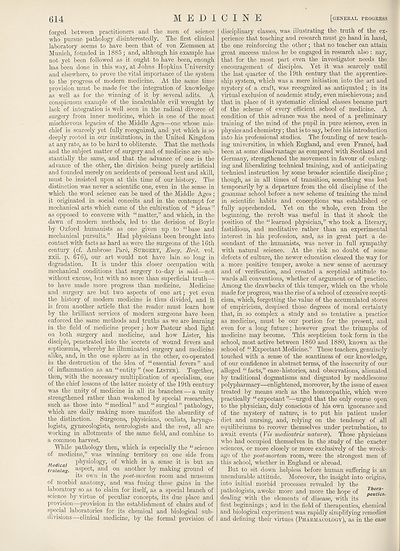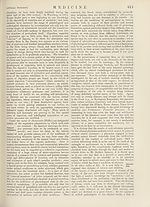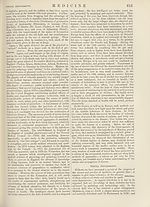New volumes of the Encyclopædia Britannica > Volume 30, K-MOR
(648) Page 614
Download files
Complete book:
Individual page:
Thumbnail gallery: Grid view | List view

614 M E D I
forged between practitioners and the men of science
who pursue pathology disinterestedly. The first clinical
laboratory seems to have been that of von Ziemssen at
Munich, founded in 1885; and, although his example has
not yet been followed as it ought to have been, enough
has been done in this way, at Johns Hopkins University
and elsewhere, to prove the vital importance of the system
to the progress of modern medicine. At the same time
provision must be made for the integration of knowledge
as well as for the winning of it by several adits. A
conspicuous example of the incalculable evil wrought by
lack of integration is well seen in the radical divorce of
surgery from inner medicine, which is one of the most
mischievous legacies of the Middle Ages—one whose mis¬
chief is scarcely yet fully recognized, and yet which is so
deeply rooted in our institutions, in the United Kingdom
at any rate, as to be hard to obliterate. That the methods
and the subject matter of surgery and of medicine are sub¬
stantially the same, and that the advance of one is the
advance of the other, the division being purely artificial
and founded merely on accidents of personal bent and skill,
must be insisted upon at this time of our history. The
distinction was never a scientific one, even in the sense in
which the word science can be used of the Middle Ages;
it originated in social conceits and in the contempt for
mechanical arts which came of the cultivation of “ ideas ”
as opposed to converse with “matter,” and which, in the
dawn of modern methods, led to the derision of Boyle
by Oxford humanists as one given up to “base and
mechanical pursuits.” Had physicians been brought into
contact with facts as hard as were the surgeons of the 16 th
century (cf. Ambrose Pare, Surgeky, Ency. Brit. vol.
xxii. p. 676), our art would not have lain so long in
degradation. It is under this closer occupation with
mechanical conditions that surgery to-day is said—not
without excuse, but with no more than superficial truth—
to have made more progress than medicine. Medicine
and surgery are but two aspects of one art; yet even
the history of modern medicine is thus divided, and it
is from another article that the reader must learn how
by the brilliant services of modern surgeons have been
enforced the same methods and truths as we are learning
in the field of medicine proper; how Pasteur shed light
on both surgery and medicine, and how Lister, his
disciple, penetrated into the secrets of wound fevers and
septicaemia, whereby he illuminated surgery and medicine
alike, and, in the one sphere as in the other, co-operated
in the destruction of the idea of “essential fevers” and
of inflammation as an “ entity ” (see Lister). Together,
then, with the necessary multiplication of specialism, one
of the chief lessons of the latter moiety of the 19 th century
was the unity of medicine in all its branches — a unity
strengthened rather than weakened by special researches,
such as those into “ medical ” and “ surgical ” pathology,
which are daily making more manifest the absurdity of
the distinction. Surgeons, physicians, oculists, laryngo¬
logists, gynaecologists, neurologists and the rest, all are
working in allotments of the same field, and combine to
a common harvest.
While pathology then, which is especially the “ science
of medicine,” was winning territory on one side from
Medical °f which in a sense it is but an
training. asPect, and on another by making ground of
its own in the post-mortem room and museum
of morbid anatomy, and was fusing these gains in the
laboratory so as to claim for itself, as a special branch of
science by virtue of peculiar concepts, its due place and
provision—provision in the establishment of chairs and of
special laboratories for its chemical and biological sub¬
divisions—clinical medicine, by the formal provision of
CINE [general progress
disciplinary classes, was illustrating the truth of the ex¬
perience that teaching and research must go hand in hand,
the one reinforcing the other; that no teacher can attain
great success unless he be engaged in research also : nay,
that for the most part even the investigator needs the
encouragement of disciples. Yet it was scarcely until
the last quarter of the 19th century that the apprentice¬
ship system, which was a mere initiation into the art and
mystery of a craft, was recognized as antiquated; in its
virtual exclusion of academic study, even mischievous; and
that in place of it systematic clinical classes became part
of the scheme of every efficient school of medicine. A
condition of this advance was the need of a preliminary
training of the mind of the pupil in pure science, even in
physics and chemistry; that is to say, before his introduction
into his professional studies. The founding of new teach¬
ing universities, in which England, and even France, had
been at some disadvantage as compared with Scotland and
Germany, strengthened the movement in favour of enlarg¬
ing anti liberalizing technical training, and of anticipating
technical instruction by some broader scientific discipline ;
though, as in all times of transition, something was lost
temporarily by a departure from the old discipline of the
grammar school before a new scheme of training the mind
in scientific habits and conceptions was established or
fully apprehended. Yet on the whole, even from the
beginning, the revolt was useful in that it shook the
position of the “ learned physician,” who took a literary,
fastidious, and meditative rather than an experimental
interest in his profession, and, as in great part a de¬
scendant of the humanists, was never in full sympathy
with natural science. At the risk no doubt of some
defects of culture, the newer education cleared the way for
a more positive temper, awoke a new sense of accuracy
and of verification, and created a sceptical attitude to¬
wards all conventions, whether of argument or of practice.
Among the drawbacks of this temper, which on the whole
made for progress, was the rise of a school of excessive scepti¬
cism, which, forgetting the value of the accumulated stores
of empiricism, despised those degrees of moral certainty
that, in so complex a study and so tentative a practice
as medicine, must be our portion for the present, and
even for a long future; however great the triumphs of
medicine may become. This scepticism took form in the
school, most active between 1860 and 1880, known as the
school of “ Expectant Medicine.” These teachers, genuinely
touched with a sense of the scantiness of our knowledge,
of our confidence in abstract terms, of the insecurity of our
alleged “ facts,” case-histories, and observations, alienated
by traditional dogmatisms and disgusted by meddlesome
polypharmacy—enlightened, moreover, by the issue of cases
treated by means such as the homoeopathic, which were
practically “expectant”'—urged that the only course open
to the physician, duly conscious of his own ignorance and
of the mystery of nature, is to put his patient under
diet and nursing, and, relying on the tendency of all
equilibriums to recover themselves under perturbation, to
await events (Vis medicatrix naturce). Those physicians
who had occupied themselves in the study of the exacter
sciences, or more closely or more exclusively of the wreck¬
age of the post-mortem room, were the strongest men of
this school, whether in England or abroad.
But to sit down helpless before human suffering is an
unendurable attitude. Moreover, the insight into origins,
into initial morbid processes revealed by the
pathologists, awoke more and more the hope of peutfcs.
dealing with the elements of disease, with its
first beginnings; and in the field of therapeutics, chemical
and biological experiment was rapidly simplifying remedies
and defining their virtues (Pharmacology), as in the case
forged between practitioners and the men of science
who pursue pathology disinterestedly. The first clinical
laboratory seems to have been that of von Ziemssen at
Munich, founded in 1885; and, although his example has
not yet been followed as it ought to have been, enough
has been done in this way, at Johns Hopkins University
and elsewhere, to prove the vital importance of the system
to the progress of modern medicine. At the same time
provision must be made for the integration of knowledge
as well as for the winning of it by several adits. A
conspicuous example of the incalculable evil wrought by
lack of integration is well seen in the radical divorce of
surgery from inner medicine, which is one of the most
mischievous legacies of the Middle Ages—one whose mis¬
chief is scarcely yet fully recognized, and yet which is so
deeply rooted in our institutions, in the United Kingdom
at any rate, as to be hard to obliterate. That the methods
and the subject matter of surgery and of medicine are sub¬
stantially the same, and that the advance of one is the
advance of the other, the division being purely artificial
and founded merely on accidents of personal bent and skill,
must be insisted upon at this time of our history. The
distinction was never a scientific one, even in the sense in
which the word science can be used of the Middle Ages;
it originated in social conceits and in the contempt for
mechanical arts which came of the cultivation of “ ideas ”
as opposed to converse with “matter,” and which, in the
dawn of modern methods, led to the derision of Boyle
by Oxford humanists as one given up to “base and
mechanical pursuits.” Had physicians been brought into
contact with facts as hard as were the surgeons of the 16 th
century (cf. Ambrose Pare, Surgeky, Ency. Brit. vol.
xxii. p. 676), our art would not have lain so long in
degradation. It is under this closer occupation with
mechanical conditions that surgery to-day is said—not
without excuse, but with no more than superficial truth—
to have made more progress than medicine. Medicine
and surgery are but two aspects of one art; yet even
the history of modern medicine is thus divided, and it
is from another article that the reader must learn how
by the brilliant services of modern surgeons have been
enforced the same methods and truths as we are learning
in the field of medicine proper; how Pasteur shed light
on both surgery and medicine, and how Lister, his
disciple, penetrated into the secrets of wound fevers and
septicaemia, whereby he illuminated surgery and medicine
alike, and, in the one sphere as in the other, co-operated
in the destruction of the idea of “essential fevers” and
of inflammation as an “ entity ” (see Lister). Together,
then, with the necessary multiplication of specialism, one
of the chief lessons of the latter moiety of the 19 th century
was the unity of medicine in all its branches — a unity
strengthened rather than weakened by special researches,
such as those into “ medical ” and “ surgical ” pathology,
which are daily making more manifest the absurdity of
the distinction. Surgeons, physicians, oculists, laryngo¬
logists, gynaecologists, neurologists and the rest, all are
working in allotments of the same field, and combine to
a common harvest.
While pathology then, which is especially the “ science
of medicine,” was winning territory on one side from
Medical °f which in a sense it is but an
training. asPect, and on another by making ground of
its own in the post-mortem room and museum
of morbid anatomy, and was fusing these gains in the
laboratory so as to claim for itself, as a special branch of
science by virtue of peculiar concepts, its due place and
provision—provision in the establishment of chairs and of
special laboratories for its chemical and biological sub¬
divisions—clinical medicine, by the formal provision of
CINE [general progress
disciplinary classes, was illustrating the truth of the ex¬
perience that teaching and research must go hand in hand,
the one reinforcing the other; that no teacher can attain
great success unless he be engaged in research also : nay,
that for the most part even the investigator needs the
encouragement of disciples. Yet it was scarcely until
the last quarter of the 19th century that the apprentice¬
ship system, which was a mere initiation into the art and
mystery of a craft, was recognized as antiquated; in its
virtual exclusion of academic study, even mischievous; and
that in place of it systematic clinical classes became part
of the scheme of every efficient school of medicine. A
condition of this advance was the need of a preliminary
training of the mind of the pupil in pure science, even in
physics and chemistry; that is to say, before his introduction
into his professional studies. The founding of new teach¬
ing universities, in which England, and even France, had
been at some disadvantage as compared with Scotland and
Germany, strengthened the movement in favour of enlarg¬
ing anti liberalizing technical training, and of anticipating
technical instruction by some broader scientific discipline ;
though, as in all times of transition, something was lost
temporarily by a departure from the old discipline of the
grammar school before a new scheme of training the mind
in scientific habits and conceptions was established or
fully apprehended. Yet on the whole, even from the
beginning, the revolt was useful in that it shook the
position of the “ learned physician,” who took a literary,
fastidious, and meditative rather than an experimental
interest in his profession, and, as in great part a de¬
scendant of the humanists, was never in full sympathy
with natural science. At the risk no doubt of some
defects of culture, the newer education cleared the way for
a more positive temper, awoke a new sense of accuracy
and of verification, and created a sceptical attitude to¬
wards all conventions, whether of argument or of practice.
Among the drawbacks of this temper, which on the whole
made for progress, was the rise of a school of excessive scepti¬
cism, which, forgetting the value of the accumulated stores
of empiricism, despised those degrees of moral certainty
that, in so complex a study and so tentative a practice
as medicine, must be our portion for the present, and
even for a long future; however great the triumphs of
medicine may become. This scepticism took form in the
school, most active between 1860 and 1880, known as the
school of “ Expectant Medicine.” These teachers, genuinely
touched with a sense of the scantiness of our knowledge,
of our confidence in abstract terms, of the insecurity of our
alleged “ facts,” case-histories, and observations, alienated
by traditional dogmatisms and disgusted by meddlesome
polypharmacy—enlightened, moreover, by the issue of cases
treated by means such as the homoeopathic, which were
practically “expectant”'—urged that the only course open
to the physician, duly conscious of his own ignorance and
of the mystery of nature, is to put his patient under
diet and nursing, and, relying on the tendency of all
equilibriums to recover themselves under perturbation, to
await events (Vis medicatrix naturce). Those physicians
who had occupied themselves in the study of the exacter
sciences, or more closely or more exclusively of the wreck¬
age of the post-mortem room, were the strongest men of
this school, whether in England or abroad.
But to sit down helpless before human suffering is an
unendurable attitude. Moreover, the insight into origins,
into initial morbid processes revealed by the
pathologists, awoke more and more the hope of peutfcs.
dealing with the elements of disease, with its
first beginnings; and in the field of therapeutics, chemical
and biological experiment was rapidly simplifying remedies
and defining their virtues (Pharmacology), as in the case
Set display mode to:
![]() Universal Viewer |
Universal Viewer | ![]() Mirador |
Large image | Transcription
Mirador |
Large image | Transcription
Images and transcriptions on this page, including medium image downloads, may be used under the Creative Commons Attribution 4.0 International Licence unless otherwise stated. ![]()
| Encyclopaedia Britannica > New volumes of the Encyclopædia Britannica > Volume 30, K-MOR > (648) Page 614 |
|---|
| Permanent URL | https://digital.nls.uk/193575925 |
|---|
| Attribution and copyright: |
|
|---|---|
| Shelfmark | EB.18 |
|---|---|
| Description | Ten editions of 'Encyclopaedia Britannica', issued from 1768-1903, in 231 volumes. Originally issued in 100 weekly parts (3 volumes) between 1768 and 1771 by publishers: Colin Macfarquhar and Andrew Bell (Edinburgh); editor: William Smellie: engraver: Andrew Bell. Expanded editions in the 19th century featured more volumes and contributions from leading experts in their fields. Managed and published in Edinburgh up to the 9th edition (25 volumes, from 1875-1889); the 10th edition (1902-1903) re-issued the 9th edition, with 11 supplementary volumes. |
|---|---|
| Additional NLS resources: |
|

